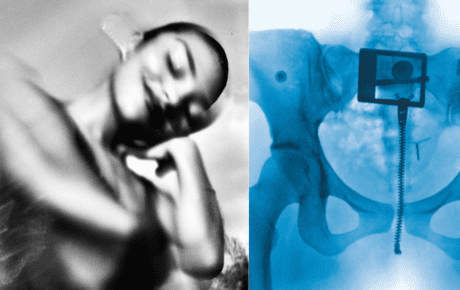“Dug a hole in the garden and buried a scream”, Florence Welch sings on her newly released sixth studio album, perhaps her heaviest and most intense yet. Everybody Scream is a brutal folk horror dealing with the most uncomfortable emotions women experience. It’s witchy and woodsy in all the classic Florence and the Machine ways, but also more raw and dark than ever before. As its name suggests, this album is total catharsis.
Boasting a magnificent list of collaborators in the indie, folk and alt-rock genres, Everybody Scream offers co-writes on several tracks from the likes of Mitski, Mark Bowen of IDLES and The National’s Aaron Dessner. This team of unique perspectives weaves a rich musical tapestry, revealing more beautiful details tucked away into the mix with every listen.
Whilst it’s widely relatable to women’s experiences as a whole, Everybody Scream primarily deals with Florence’s life as a performer. Her isolation is not built from living in a cottage alone in the woods as her public image leads us to believe, but rather from the constant transition between total solitude, and the chaos of the stage.
Florence relishes control over her captive audiences, calling them to join her in emotional release on the title track. It’s a love letter celebrating the magic of performing. Soaring production presents Florence as a witch commanding her cult. She shouts and wails, then sighs after the post-concert high wears off, “I made a thousand people love me, now I’m all alone”. Still, there’s such magic in the ego boost the performance gives her, and the thrill is contagious.
These images of growing into such a powerful being persist on ‘Kraken’, an instant career highlight where even in moments of peace at home, memories of touring flash behind Florence’s eyes and transform her into a larger-than-life beast. “Did you know how big I would become?” She asks, a tongue-in-cheek nod to how her career has blossomed since her debut Lungs back in 2008. As she notes, many of her peers from the same time period could not sustain such success. But the Florence and the Machine project has carried her for an incredibly long time to the top of her craft, despite the very real physical and mental toll it’s taken upon her.
Naturally, this musical journey of nearly twenty years cannot be separated from Florence’s gender within a misogynistic music industry. The spiky, barbed lyrics of ‘One of the Greats’ explore how few women go down in history in comparison to men, in a simple and sarcastic manner. “I’ll be up there with the men and the 10 other women in the hundred greatest records of all time”, Florence shrugs, over slinky guitars and smooth, subtle drums. Once again, she owns her own strength and skill, but simultaneously grieves the rarity of women alongside her to share the adventure with.
Her attitude on the topic is frequently winking and clever in this way. She name drops The 1975 on ‘Music by Men’ as a reason to justify listening to male art again, but of course, she’s still unsure if it’d really be worth letting those masculine perspectives back in. It’s a prime example of how Florence and the Machine wisely intertwines current language and slang with her traditional timeless flair. Such brief sparks of humour ground the record, bringing light into an otherwise frequently dark space,
Such darkness comes with the exploration of Florence’s ectopic pregnancy. During her Dance Fever tour in 2023, this devastating miscarriage caused severe internal bleeding which nearly killed her. When she performed through this agony, a reviewer gave her four out of five stars. She wryly notes this on ‘Music by Men’, acknowledging how blood, sweat and tears are somehow never enough.
The gore, body horror and personal terror felt from such a time ripples through every song. It’s most explicit on ‘Witch Dance’, where warbling background vocals and skittering campfire rhythms underscore Florence’s haunting rendition of her near-death encounter as a sexual escapade. Driven by desire and aggression, this track is so hot on the surface, digging deeper into this meaning will leave third-degree burns.
Other brutal feminine experiences litter the record. There’s the lack of real intimacy in relationships which serves as the centerpiece of ‘Buckle’, a smart and profound song riddled with double meanings. The rushing stream of consciousness piece ‘Perfume and Milk’ also stands out from the pack, where Florence searches to centre herself within her body in its natural cycles of growth, decay and regeneration.
She can only conclude there is no biological fact of womanhood, but rather only the definition of exclusive, isolating pain. “A piece of flesh, a million pounds / Am I a woman now?” Florence bellows on ‘You Can Have It All’. Gritty guitars build cinematic, explosive instrumentals, which hum with the buzzing energy of pure gothic romance and tragedy.
Despite the intensity of the journey, Florence ensures she leaves the listener on a note of hope, no matter how despondent. The final track ‘And Love’ repeatedly whispers “Peace is coming”, a desperate plea that at first sounds unbelievable, but soon becomes a beacon for a better future. This song shows impressive restraint on the production. It is perfectly sparse and dreamy, a breath of fresh air with its delicate pianos and sparkling harps, as Florence moves from monstrous and demonic to angelic and pure, learning to move on from the past.
Everybody Scream is far from an easy listen, but it’s a necessary one. It’s a grim collection, honest and matter-of-fact about the realities of living a life as unusual as Florence Welch’s. Its sonic direction is both classic and modern all at once, making it a moving listen at any point in time. The sheer expanse of this record proves just why Florence and the Machine does, in fact, deserve to go down as ‘One of the Greats’.












